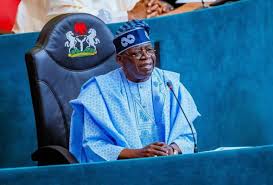Nigeria’s quest for sustainable economic growth is beginning to yield results two years into President Bola Ahmed Tinubu’s administration, government officials and stakeholders said on Friday at a town meeting in Lokoja Kogi state capital
The town hall meeting, organised by the Federal Ministry of Information and National Orientation, provided an avenue to review the administration’s mid-term achievements.
Mrs. Sabina Abalaka, Head of the Federal Information Centre in Lokoja, said the Federal Government had taken “bold and concrete steps” to tackle long-standing economic challenges, particularly through the removal of fuel subsidy.
“Nation-building is never without sacrifice. The current pains are necessary, but they will soon give way to recovery and inclusive growth,” Abalaka told participants at the event, held at the Nigeria Union of Journalists (NUJ) Secretariat in Lokoja.
She stressed that the subsidy removal, though painful, was intended to free resources for strategic investments in infrastructure, education, and agriculture—the key pillars of the Tinubu administration’s Renewed Hope Agenda.
The Guest speaker and former Head of the Federal Information Centre, Alhaji Lawal Karim Shuaib, described the steel industry as “the pinnacle of Nigeria’s economic recovery,” noting that the revival of Ajaokuta Steel Company is critical to the nation’s industrial future.
He revealed that the plant is projected to produce 10 million tonnes of liquid steel annually by 2030, in addition to military hardware, expressing optimism that the effort will transform Ajaokuta into a hub of industrialization and free trade, creating thousands of jobs.
READ ALSO, Kogi Poly, FUL Sign MoU to Launch Degree Programmes
Shuaib also disclosed that construction had begun on five mini-LNG plants in Ajaokuta, adding that the $500 million project, covering 33 hectares, will have a combined capacity of 84.5 million cubic feet of gas per day, producing condensate, LPG, LNG, and CNG.
“These projects are part of efforts to achieve the President’s vision of building a $1 trillion economy,” he stated.
The stakeholders also underscored the administration’s human capital investment with Abalaka highlighting the Nigerian Education Loan Fund (NELFUND), launched in 2023, adding that it has provided interest-free loans to more than 396,000 students nationwide, breaking financial barriers to higher education.
Isah Ismaila, Special Adviser on Media to Governor Usman Ahmed Ododo, represented by Mrs. Rosemary Oyiza Bello-Salami, said agriculture had received unprecedented attention under the administration.
He cited the Renewed Hope Agricultural Mechanization Programme (RHAMP), through which the Federal Government deployed 2,000 tractors and 9,022 implements nationwide.
He added that in Kogi State, Governor Ododo refurbished 200 abandoned tractors,saving N20 billion and empowered over 10,000 farmers across 76 farm clusters.
The state government, he also revealed, has acquired 15 new mining licenses and plans to train 25,000 youths in mineral exploration, further boosting local economic activities.
NEWSHOUR VIDEO; KOGI GOVT BANS GRADUATION CEREMONIES, UNVEILS NEW REFORMS
On rural infrastructure, he disclosed that Governor Ododo recently flagged off the construction of a 19.55km road under the Rural Access and Agricultural Marketing Project (RAAMP) to improve farmers’ access to markets and reduce post-harvest losses.
Stakeholders at the meeting testified to the visible impact of the government’s policies.
The Maigari of Lokoja, His Royal Majesty, Alhaji Ibrahim Gambo Kabir Maikarfi IV,represented by the Matawalle of Lokoja, Alhaji Adamu Muazu commended the Ododo administration for stabilizing salaries and pensions in the state, while urging greater investment in teacher recruitment.
Market women representatives said the government’s support has enabled many to start or expand businesses.




